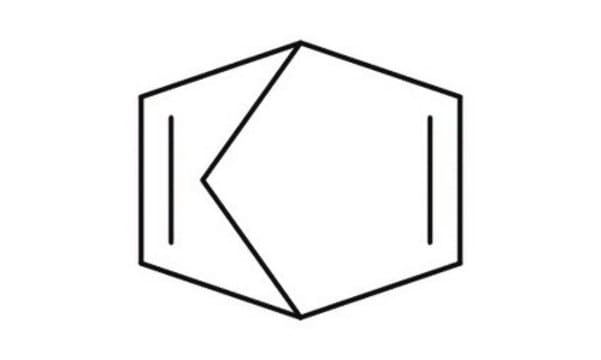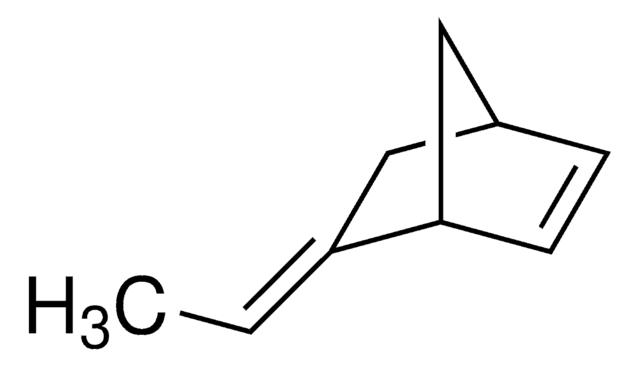B33803
Bicyclo[2.2.1]hepta-2,5-diene
98%
Synonym(s):
2,5-Norbornadiene, NBD
About This Item
Recommended Products
Quality Level
Assay
98%
form
liquid
contains
0.05-0.25% BHT as inhibitor
refractive index
n20/D 1.470 (lit.)
bp
89 °C (lit.)
density
0.906 g/mL at 25 °C (lit.)
SMILES string
C1[C@H]2C=C[C@@H]1C=C2
InChI
1S/C7H8/c1-2-7-4-3-6(1)5-7/h1-4,6-7H,5H2/t6-,7+
InChI key
SJYNFBVQFBRSIB-KNVOCYPGSA-N
Looking for similar products? Visit Product Comparison Guide
Related Categories
Application
Features and Benefits
Signal Word
Danger
Hazard Statements
Precautionary Statements
Hazard Classifications
Aquatic Chronic 3 - Flam. Liq. 2
Storage Class Code
3 - Flammable liquids
WGK
WGK 2
Flash Point(F)
-5.8 °F - closed cup
Flash Point(C)
-21 °C - closed cup
Personal Protective Equipment
Certificates of Analysis (COA)
Search for Certificates of Analysis (COA) by entering the products Lot/Batch Number. Lot and Batch Numbers can be found on a product’s label following the words ‘Lot’ or ‘Batch’.
Already Own This Product?
Find documentation for the products that you have recently purchased in the Document Library.
Customers Also Viewed
Articles
MOST offers controlled solar energy harvesting and storage, addressing global energy demands with improved storage techniques.
MOST offers controlled solar energy harvesting and storage, addressing global energy demands with improved storage techniques.
MOST offers controlled solar energy harvesting and storage, addressing global energy demands with improved storage techniques.
MOST offers controlled solar energy harvesting and storage, addressing global energy demands with improved storage techniques.
Our team of scientists has experience in all areas of research including Life Science, Material Science, Chemical Synthesis, Chromatography, Analytical and many others.
Contact Technical Service
![Bicyclo[2.2.1]hept-2-ene 99%](/deepweb/assets/sigmaaldrich/product/structures/270/492/95fd4909-6108-4858-8c94-609b54387149/640/95fd4909-6108-4858-8c94-609b54387149.png)

![(1S,4S)-2,5-Diphenylbicyclo[2,2,2]octa-2,5-diene 95%](/deepweb/assets/sigmaaldrich/product/structures/313/518/9c1268bf-134a-47cd-81a6-1df7562812d2/640/9c1268bf-134a-47cd-81a6-1df7562812d2.png)







